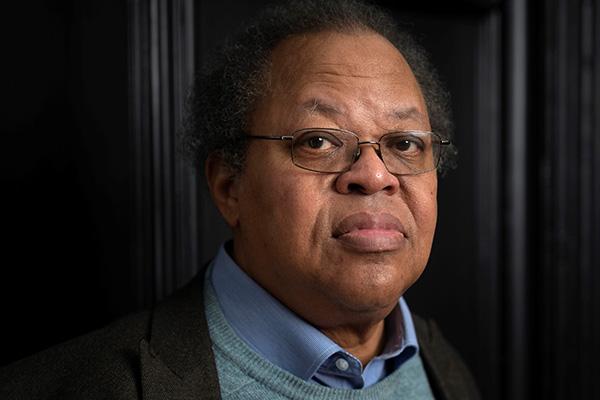
The Music Theory area will hold this year's William Poland Lecture on Thursday, February 22. George Lewis, American composer, musicologist and trombonist, will present "There Are Black Composers in the Future: New Music and the Heterogenous Sound Ideal."
The writings of African American composer Olly Wilson (1937–2018) exercised enormous influence in proposing an African-American musical aesthetic in contemporary classical music. Wilson portrays Afrodiasporic music-making as exhibiting “shared conceptual approaches,” which he eventually subsumes under his notion of the “heterogeneous sound ideal…a fundamental bias for heterogeneity of sound rather than similarity of color or homogeneity.”
An influential 1991 essay by art historian Robert L. Douglas, while not referencing Wilson’s work, proposes something quite similar in the visual arts, with his notion of “multidominant elements,” or “the multiple use of colors in intense degrees, or the multiple use of textures, design patterns, or shapes.” For Douglas, multidominance is well described with reference to multiple meters in traditional African music, but he uses the concept to contextualize the work of the Africobra artists who began their work in the late 1960s, including Jeff Donaldson, Wadsworth Jarrell, Jae Jarrell, and Barbara Jones-Hogu. Moreover, both Wilson and Douglas may be placed in intersection with art historian Robert Farris Thompson, who saw the black Atlantic visual tradition — for example, Akan asadua cloth, woven using narrow, multistrip patterns — as displaying “a propensity for multiple meter.”
Wilson presents numerous examples of the heterogeneous sound ideal in a wide range of African and African American musical practices, with the curious exception of contemporary music — his own primary field. His 1970 orchestra work Voices, however, exemplifies many of the tendencies he identifies; its swirling, repetitive sonic behaviors and uncanny effects are only one part of the work’s overall heterogeneity of sound and color. The main direction in this talk, then, is taken directly from Wilson’s piece. Through examples from the work of a diverse (and by no means exhaustive) range of Afrodiasporic contemporary composers, I want to identify aesthetic directions that appear frequently in Afrodiasporic contemporary classical music since 1960, connecting these with larger issues in the creolization of the field as a whole.
George Lewis is Edwin H. Case Professor of American Music and Area Chair in Composition at Columbia University, and currently serves as Artistic Director of the International Contemporary Ensemble. A 2020–21 Fellow of the Wissenschaftskolleg zu Berlin, Lewis is also a Fellow of the American Academy of Arts and Sciences and the American Academy of Arts and Letters, a Corresponding Fellow of the British Academy, and a member of the Akademie der Künste Berlin, Lewis’ other honors include the Doris Duke Artist Award (2019), a MacArthur Fellowship (2002), and a Guggenheim Fellowship (2015). A member of the Association for the Advancement of Creative Musicians (AACM) since 1971, Lewis' work is presented by ensembles worldwide, published by Edition Peters. A Yamaha Artist, Lewis is widely regarded as a pioneer in the creation of computer programs that improvise in concert with human musicians.
Lewis’ central areas of scholarship include the history and criticism of experimental music, computer music, interactive media and improvisation, particularly as these areas become entangled with the dynamics of race, gender and decolonization. His widely acclaimed book, A Power Stronger Than Itself: The AACM and American Experimental Music (University of Chicago Press, 2008) received the American Book Award and the American Musicological Society’s Music in American Culture Award. Lewis is the co-editor (with Harald Kisiedu) of the bilingual (German/English) edited volume Composing While Black: Afrodiasporic New Music Today/Afrodiasporische Neue Musik Heute (2023), as well as (with Benjamin Piekut) the two-volume Oxford Handbook of Critical Improvisation Studies (2016). Lewis holds honorary doctorates from the University of Edinburgh, Harvard University, the University of Pennsylvania, Oberlin College, the School of the Art Institute of Chicago, New England Conservatory, New College of Florida, and Birmingham City University, among others. Read more.
This lecture is free and open to the public. No ticket required.
The William Poland Lecture Series provides an opportunity for members of the School of Music and the university-at-large to hear distinguished scholars in music theory and related fields.
All events are subject to change.
This lecture is held in the Colloquia Room, 18th Avenue Library, 175 W. 18th Ave. room 340. Campus visitors may use the Tuttle Park Place Garage or the Ohio Union South Garage.
Driving and Parking Instructions
For additional lectures, visit Musicology Events
